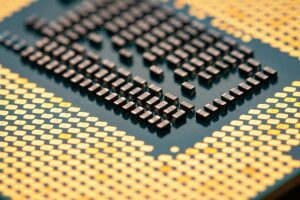In a world where technology is advancing at an unprecedented pace, the development of artificial intelligence (AI) has brought about both excitement and concern. As AI systems become increasingly integrated into our daily lives, the question of privacy and security looms large.
With the ability to process vast amounts of data and make decisions without human oversight, AI has the potential to pose significant risks to our personal and collective well-being. This prologue serves as a call to explore the many facets of privacy and security in AI as we navigate the uncharted waters of this rapidly evolving technology.
From the potential for data breaches and cyber attacks to the ethical implications of AI decision-making, we must work together to understand and mitigate the risks associated with AI while reaping its benefits. As we begin this journey, we must remember that the future of AI is in our hands, and it is up to us to shape it in a way that serves the greater good.
Exploring the privacy and security issues in AI
One of the most pressing privacy and security issues in AI is the handling of personal data. As AI systems collect and process vast amounts of data, there is a risk that this information could be mishandled, either through intentional breaches or accidental leaks. This could result in sensitive information falling into the wrong hands, leading to identity theft, financial fraud, and other forms of abuse.
Another concern is the potential for AI systems to be hacked or manipulated. As AI systems become more complex and autonomous, the risk of cyber-attacks increases. These attacks could allow malicious actors to take control of the AI system, causing it to make harmful decisions for individuals or society as a whole.

In addition to these technical security issues, there are also ethical concerns surrounding AI decision-making. With the ability to process vast amounts of data, AI systems have the potential to make decisions that are biased or discriminatory. This could lead to unfair treatment of certain individuals or groups, exacerbating existing social inequalities.
To address these concerns, it is important for the development of AI to be guided by a strong framework of privacy and security principles. This should include measures to protect personal data, such as encryption and secure data storage, as well as protocols for handling data breaches and cyber-attacks. It is also essential to ensure that AI systems are transparent and accountable in their decision-making, with mechanisms in place to detect and address bias.
Artificial intelligence is both Yin and Yang
Now let’s discuss everything in detail.
The relation between AI and cybersecurity
The relationship between AI and cybersecurity is closely intertwined, as AI systems are increasingly being used to help detect, prevent, and respond to cyber threats.
On the one hand, AI can be used to improve cybersecurity by analyzing vast amounts of data to detect patterns and anomalies that may indicate a cyber attack. This can include identifying suspicious network traffic, detecting malware, and identifying vulnerable systems. AI-based systems can also be used to automatically respond to cyber threats, such as by shutting down infected systems or quarantining malicious files.
On the other hand, AI can also be used by cyber attackers to improve the sophistication and effectiveness of their attacks. For example, AI can be used to generate sophisticated phishing attacks that are designed to evade detection. AI-based malware can also adapt and evolve to avoid detection by traditional security systems.
Therefore, it’s important to have AI security in place to protect AI systems from being exploited by malicious actors. This can include implementing secure design principles for AI systems, such as ensuring that data is properly encrypted and that systems are segmented and isolated to limit the scope of a potential attack. It’s also important to continuously monitor and audit AI systems to detect and respond to any security incidents or vulnerabilities.

Key takeaways:
- Artificial intelligence systems should be designed with transparency and explainability in mind to ensure accountability and mitigate security issues.
- Organizations should not rely solely on artificial intelligence for security and should also invest in other security measures to address security issues.
- Bias and discrimination in artificial intelligence can lead to security issues and can be mitigated by using unbiased data and implementing bias detection mechanisms.
- Artificial intelligence systems are vulnerable to attacks, so it’s important to have security measures in place to protect them from security issues.
- Continuously monitoring and auditing artificial intelligence systems is crucial to identify and mitigating any security issues that may arise.
The disadvantages and challenges of AI in security
Artificial intelligence has the potential to revolutionize security, but it also poses significant risks. These risks include lack of transparency and explainability, overreliance on AI, bias, and discrimination, vulnerability to attacks, lack of human oversight, high cost, and privacy concerns. These risks can lead to incorrect decisions and a false sense of security, negatively impacting individuals or groups.
It’s important for organizations to understand these risks and take steps to mitigate them as they adopt AI-based security systems. By implementing secure design principles, continuously monitoring and auditing AI systems, and having a framework in place to address bias, organizations can ensure that AI is used in a way that serves the greater good and protects the rights of all individuals.
Lack of transparency and explainability
AI systems can be difficult to understand and interpret, making it challenging to understand how and why decisions are being made. This can be particularly problematic in security contexts, where decisions related to identifying and responding to cyber threats may have serious consequences.
Overreliance on AI
As organizations adopt AI-based security systems, there is a risk that they may become too reliant on these systems, leading to a false sense of security. This can cause them to neglect other important security measures, such as employee training and incident response planning.
Bias and discrimination
AI systems are only as good as the data they are trained on; if the data is biased, the AI system can also be biased. This can lead to unfair treatment of certain individuals or groups and can exacerbate existing social inequalities.
Vulnerability to attacks
AI systems can also be vulnerable to attacks, such as adversarial machine learning attacks, where an attacker manipulates the input data of an AI model to change the output. This can cause the AI system to make incorrect decisions, leading to security breaches.

Lack of human oversight
AI systems can operate autonomously, which can lead to decisions being made without human oversight. This can be problematic in situations where the AI system is making security decisions, as it may not be able to assess the risks and consequences of a given action properly.
High cost
Implementing AI-based security systems can be expensive, particularly for small and medium-sized businesses that may not have the resources to invest in such technology.
Privacy concerns
AI systems used for security purposes can collect and process large amounts of data, which can raise privacy concerns. This data may contain personal information and, if not properly protected, can lead to data breaches, identity theft, or financial fraud.
The misuse of artificial intelligence may lead to major risks
The misuse of artificial intelligence can lead to significant risks. These risks include potential human rights violations, such as discrimination and privacy violations, as well as the possibility of malicious use of AI in cyber attacks, financial fraud, and the creation and spread of misinformation. Additionally, the overreliance on AI, lack of transparency and human oversight, and the potential of job displacement are also among the risks. It’s crucial to have regulations, ethical guidelines, and security measures in place to prevent the misuse of AI and mitigate the risks it may cause.
Don’t miss this academic article called “Artificial Intelligence Security: Threats and Countermeasures” to learn more about this topic.
How can artificial intelligence be misused?
Artificial intelligence (AI) has the potential to be misused in a variety of ways, including:
Autonomous weapons
AI systems can be used to develop autonomous weapons, make decisions, and take actions without human oversight. This can raise concerns about the accountability and ethical implications of such weapons.
Surveillance
AI systems can be used to conduct mass surveillance, which can raise concerns about privacy and civil liberties.
Transfer learning attacks
Many machine learning systems rely on pre-trained models that are tailored to specific tasks through specialized training. This is where transfer learning attacks can be particularly dangerous, as an attacker can exploit a well-known model to deceive a task-specific ML system. It is essential for security teams to be vigilant for unusual activity or unexpected ML behaviors, as this can help identify these types of attacks.
Manipulation
AI systems can create deepfake videos, fake news, and other forms of digital manipulation, which can spread misinformation and influence public opinion.

Discrimination
AI systems can perpetuate bias, as they can be trained on biased data, leading to discriminatory decisions and actions.
Financial fraud
AI systems can conduct financial fraud, for example, by automating phishing attacks or creating fake identities to commit financial crimes.
Online system manipulation
The internet is crucial for the development of AI/ML systems, and many machines are connected to the internet during the learning process, making them vulnerable to attacks. Hackers can exploit this vulnerability by providing false inputs to the system or gradually altering it to produce inaccurate outputs. To prevent this type of attack, scientists and engineers can take measures such as strengthening and securing system operations and keeping records of data ownership.
New artificial intelligence can diagnose a patient using their speech
Cyber attacks
AI systems can be used to launch sophisticated cyber attacks, such as by automating the discovery of vulnerabilities or creating malware that can evade detection.
Job displacement
AI systems have the potential to automate tasks that were traditionally performed by humans, leading to job displacement and negatively affecting the economy.
Data corruption and poisoning
ML systems depend on vast amounts of data, making it important for organizations to guarantee the integrity and authenticity of their datasets. If not, their AI/ML machines may produce false or harmful predictions by targeting the datasets. This type of attack is done by damaging or “poisoning” the data with the goal of manipulating the learning system. Businesses can avoid this by enforcing strict PAM policies that restrict access to training data within protected computing environments.
Healthcare
AI systems can be used to diagnose medical conditions, but if not properly validated and monitored, they can lead to wrong diagnoses, treatments, and even death.
It’s important to have regulations, ethical guidelines, and security measures in place to prevent the misuse of AI. Organizations should be aware of these risks and take steps to mitigate them as they adopt AI-based systems. By being transparent and accountable in the development and deployment of AI, organizations can ensure that AI is used in a way that serves the greater good and protects the rights of all individuals.
Key takeaways:
- Human oversight is necessary to ensure that artificial intelligence systems make ethical decisions and mitigate security issues.
- The cost of implementing artificial intelligence-based security systems should be considered to mitigate security issues.
- To mitigate security issues, privacy concerns should be considered when collecting and processing personal data by artificial intelligence systems.
- Misuse of artificial intelligence can lead to major security issues, including human rights violations and malicious activities.
- Having regulations and ethical guidelines in place can help prevent the misuse of artificial intelligence and mitigate security issues.

How can AI violate human rights?
Artificial intelligence (AI) has the potential to violate human rights by perpetuating bias and discrimination in decision-making processes. This can happen when AI systems are trained on biased data, leading to unfair or discriminatory decisions toward certain individuals or groups based on factors such as race, gender, age, sexual orientation, or other characteristics. Additionally, the collection, processing, and analysis of personal data by AI systems can raise privacy concerns, as it can track individuals, monitor their behavior, and restrict their freedom of expression or movement.
Best artificial intelligence tools to improve productivity in 2022
Furthermore, AI used in surveillance can be misused to target certain individuals or groups, violating their right to privacy, freedom of expression, and association. The use of AI in autonomous weapon systems may also raise concerns about accountability and ethical implications of such weapons, violating the right to life and human dignity. It’s important to have regulations, ethical guidelines, and security measures in place to prevent the violation of human rights by AI systems.
Final words
In conclusion, artificial intelligence (AI) has the potential to revolutionize the field of security, but it also poses significant risks. These risks include lack of transparency and explainability, overreliance on AI, bias and discrimination, vulnerability to attacks, lack of human oversight, high cost, and privacy concerns. It’s important for organizations to understand these risks and take steps to mitigate them as they adopt AI-based security systems. By implementing secure design principles, continuously monitoring and auditing AI systems, and having a framework in place to address bias, organizations can ensure that AI is used in a way that serves the greater good and protects the rights of all individuals.
- SEO Powered Content & PR Distribution. Get Amplified Today.
- Platoblockchain. Web3 Metaverse Intelligence. Knowledge Amplified. Access Here.
- Source: https://dataconomy.com/2023/01/artificial-intelligence-security-issues/
- 1
- a
- ability
- Able
- About
- abuse
- academic
- access
- accountability
- ACM
- Action
- actions
- activities
- activity
- adapt
- addition
- Additionally
- address
- adopt
- adversarial
- affecting
- AI
- AI systems
- AI/ML
- All
- among
- amounts
- analysis
- analyzing
- and
- article
- artificial
- artificial intelligence
- Artificial intelligence (AI)
- associated
- Association
- attack
- Attacks
- audit
- auditing
- authenticity
- automate
- automatically
- automating
- autonomous
- autonomously
- based
- become
- being
- benefits
- between
- bias
- breaches
- brought
- businesses
- call
- called
- Cause
- causing
- certain
- challenges
- challenging
- change
- characteristics
- civil liberties
- closely
- collect
- Collecting
- collection
- Collective
- commit
- complex
- computing
- Concern
- Concerns
- conclusion
- conditions
- Conduct
- connected
- Consequences
- considered
- contexts
- control
- Corruption
- Cost
- could
- create
- Creating
- creation
- Crimes
- crucial
- cyber
- Cyber Attack
- Cyber Attacks
- Cybersecurity
- daily
- damaging
- Dangerous
- data
- Data Breaches
- data storage
- datasets
- Death
- Decision Making
- decisions
- deployment
- Design
- design principles
- designed
- detail
- Detection
- develop
- Development
- difficult
- digital
- discovery
- Discrimination
- discuss
- down
- during
- economy
- effectiveness
- either
- Employee
- encrypted
- encryption
- enforcing
- Engineers
- ensure
- ensuring
- environments
- essential
- ethical
- ethics
- Even
- everything
- evolve
- evolving
- example
- Excitement
- existing
- expensive
- Explainability
- Exploit
- exploited
- explore
- facets
- factors
- fake
- fake news
- Falling
- field
- Files
- financial
- financial crimes
- forms
- Framework
- fraud
- Freedom
- from
- future
- Future of AI
- Gender
- generate
- given
- goal
- good
- gradually
- greater
- Group’s
- guarantee
- guidelines
- hacked
- hackers
- Handling
- Hands
- happen
- harmful
- having
- healthcare
- help
- High
- How
- HTTPS
- human
- human rights
- Humans
- identify
- identifying
- identities
- Identity
- identity theft
- implementing
- implications
- important
- improve
- in
- In other
- inaccurate
- incident
- incident response
- include
- Including
- Increases
- increasingly
- indicate
- individuals
- inequalities
- influence
- information
- input
- integrated
- integrity
- Intelligence
- Intentional
- Internet
- Invest
- isolated
- issues
- IT
- Job
- journey
- keeping
- Lack
- large
- launch
- lead
- leading
- Leaks
- LEARN
- learning
- Life
- LIMIT
- Lives
- machine
- machine learning
- Machines
- made
- major
- make
- Making
- malware
- manipulated
- manipulating
- Manipulation
- many
- Mass
- max-width
- measures
- medical
- mind
- Misinformation
- Mitigate
- mitigating
- ML
- model
- models
- Monitor
- monitored
- monitoring
- more
- most
- movement
- Navigate
- necessary
- negatively
- network
- network traffic
- news
- ONE
- operate
- Operations
- Opinion
- organizations
- Other
- Oversight
- ownership
- Pace
- particularly
- patient
- patterns
- personal
- personal data
- phishing
- phishing attacks
- Place
- planning
- plato
- Plato Data Intelligence
- PlatoData
- policies
- poses
- possibility
- potential
- Predictions
- prevent
- principles
- privacy
- Privacy and Security
- process
- processes
- processing
- produce
- productivity
- Progress
- Prologue
- properly
- protect
- protected
- protection
- protocols
- providing
- public
- public opinion
- purposes
- question
- Race
- raise
- rapidly
- records
- regulations
- related
- relation
- relationship
- remember
- Resources
- Respond
- response
- restrict
- result
- revolutionize
- rights
- Risk
- risks
- scientists
- scope
- secure
- securing
- security
- security breaches
- security systems
- sense
- sensitive
- serious
- serves
- Sexual
- Shape
- should
- significant
- situations
- small
- So
- Social
- Society
- sophisticated
- specialized
- specific
- spread
- Steps
- storage
- strengthening
- strict
- strong
- such
- Surrounding
- surveillance
- suspicious
- system
- Systems
- tailored
- Take
- Takeaways
- Target
- targeting
- tasks
- teams
- Technical
- Technology
- The
- The Future
- theft
- their
- threats
- Through
- to
- together
- too
- tools
- topic
- toward
- track
- traditional
- traditionally
- traffic
- trained
- Training
- transfer
- Transparency
- transparent
- treatment
- types
- understand
- Unexpected
- unprecedented
- unusual
- us
- use
- validated
- variety
- Vast
- Videos
- Violating
- VIOLATION
- Violations
- Vulnerabilities
- vulnerability
- Vulnerable
- ways
- Weapons
- well-known
- which
- while
- within
- without
- Work
- work together
- world
- Wrong
- wrong hands
- zephyrnet











